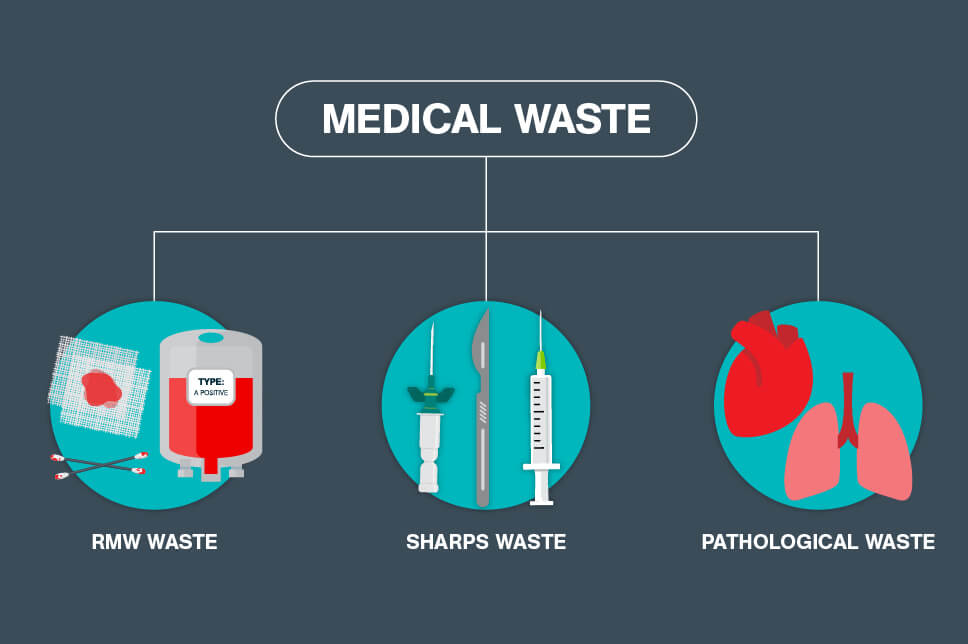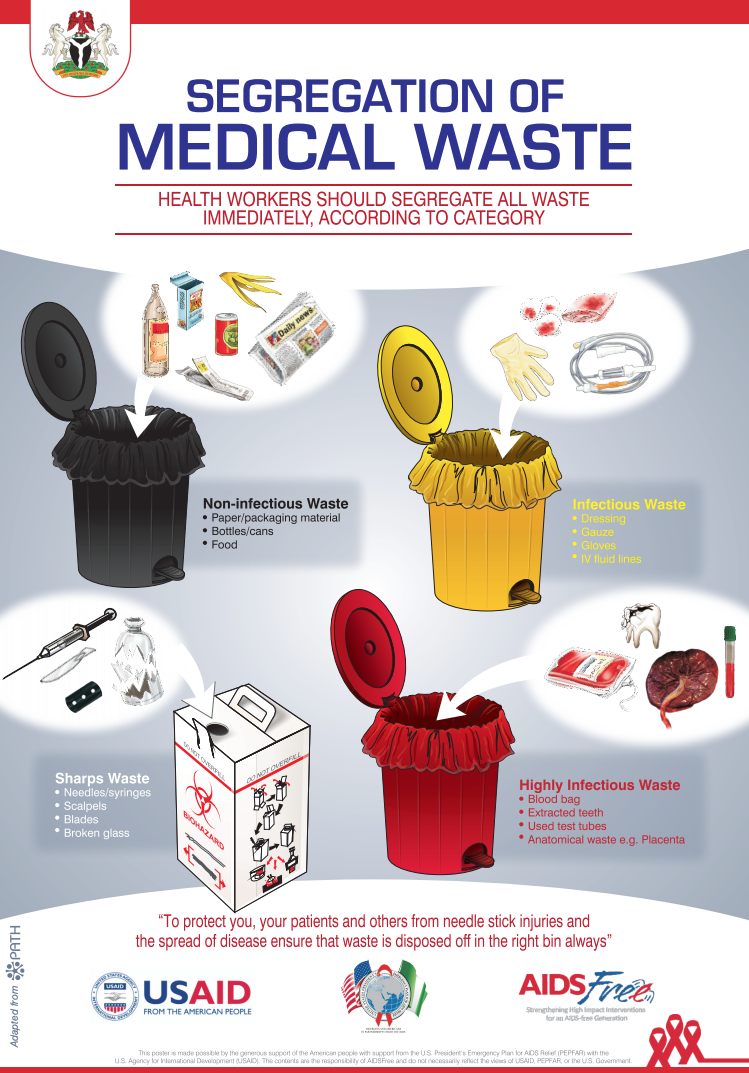Complete Medical Waste Removal Service: Smooth Disposal for Health Care Facilities
Wiki Article
Best Practices for Medical Waste Administration
Clinical waste monitoring is a crucial aspect of healthcare facilities' procedures to make certain the safety and security of people, team, and the setting. Carrying out finest methods in medical waste management is vital to decrease the threats linked with hazardous waste.
Segregation and Classification
In the area of medical waste management, correct segregation and categorization are important practices for making certain the secure and reliable disposal of healthcare-related products. Clinical waste is generated from numerous resources, including hospitals, facilities, laboratories, and other medical care facilities. It is composed of a large range of things, such as needles, syringes, bandages, handwear covers, and pharmaceutical waste.Segregation entails the methodical splitting up of different kinds of medical waste based on their attributes and potential dangers. Sharps waste, such as blades and needles, ought to be positioned in puncture-resistant containers to avoid injuries and the spread of infectious illness.
Classification is the procedure of identifying clinical waste right into various groups based on its potential threats. These groups might consist of transmittable waste, contaminated materials, pharmaceutical waste, and basic waste. By classifying waste, healthcare centers can determine the suitable disposal methods and guarantee compliance with local policies and guidelines.
Proper segregation and classification of clinical waste not just secure the health and wellness and security of health care workers and the public however likewise contribute to the overall efficiency and performance of waste monitoring. It minimizes the danger of mishaps, reduces environmental influences, and advertises accountable waste disposal techniques.
Correct Storage and Labeling
To ensure the effective and safe disposal of clinical waste, health care facilities have to stick to appropriate storage space and labeling practices. WasteX Medical Waste Disposal. Appropriate storage and labeling play a critical function in maintaining the stability of medical waste monitoring systems and safeguarding the health and wellness of medical care workers, people, and the publicWhen it pertains to storage space, it is necessary to have actually designated locations specifically created for various kinds of clinical waste. These areas must be secure, well-ventilated, and furnished with appropriate containers that satisfy governing standards (medical waste disposal). Partition and categorization of waste must additionally be taken into factor to consider to stay clear of cross-contamination and potential dangers

Regular surveillance and examination of storage space areas and containers are vital to determine any problems or offenses. Team must be trained on proper storage space and labeling methods, highlighting the significance of conformity with laws and procedures.
Safe Transport and Handling
Making sure the protected and proper transportation and handling of clinical waste is important for preserving the honesty of waste administration systems and protecting the health and wellness of all involved. Clinical waste, that includes things polluted with transmittable materials, drugs, and other hazardous materials, should be transferred in a fashion that avoids leakages, spills, and potential contamination.To attain safe transport and handling, several ideal methods need to be complied with. It is vital to use puncture-resistant and watertight containers that are particularly created for clinical waste. These containers should be effectively sealed and labeled to stop any unexpected direct exposure or mishandling. Furthermore, waste must be set apart based on its nature and kind to protect against cross-contamination.
Throughout transport, it is very important to ensure that waste containers are securely fastened and stored in a stable manner. Automobiles utilized for delivering clinical waste must be outfitted with appropriate safety functions, such as spill control systems, to decrease the risk of any type of leaks or spills. Chauffeurs need to receive training on appropriate handling and emergency situation reaction procedures to successfully deal with any type of unanticipated occurrences.
Moreover, the transportation and handling of medical waste should follow all pertinent guidelines and guidelines stated by local, state, and federal authorities. WasteX Medical Waste Disposal. medical waste removal service. Routine evaluations and audits click reference should be carried out to analyze conformity and identify any kind of areas for improvement
Conformity With Regulatory Guidelines
Keeping compliance with governing guidelines is important for reliable medical waste administration. These standards are established to shield public health and wellness and the setting by guaranteeing that clinical waste is correctly handled, dealt with, and disposed of. Conformity with regulatory standards helps to stop the spread of infectious illness, minimize prospective hazards, and decrease the total impact of medical waste on the setting.To achieve compliance, health care centers must stay notified concerning the particular guidelines controling medical waste administration in their territory. These laws may vary from country to nation, and also within various states or regions. It is crucial for medical care facilities to have a detailed understanding of these standards and to execute proper strategies and procedures to make certain compliance.
One secret facet of compliance is the appropriate segregation and labeling of different sorts of clinical waste. This consists of dividing sharps from various other waste, as well as categorizing waste based on its potential dangers. Health care centers need to additionally make certain that clinical waste is saved in ideal containers which these containers are properly labeled and sealed.
Additionally, compliance with regulatory guidelines calls for medical care centers to develop appropriate training and education programs for personnel members associated with clinical waste monitoring. This consists of supplying training on waste segregation, dealing with, and disposal procedures, as well as the proper use individual protective equipment.
Regular surveillance and audits are additionally important to guarantee ongoing compliance with regulatory standards. This entails performing routine assessments of waste storage areas, documenting waste monitoring procedures, and maintaining documents of garbage disposal.
Efficient Disposal Methods
Medical care centers should utilize effective disposal approaches for appropriate management of clinical waste. Incorrect disposal of clinical waste can present major wellness and ecological risks. There are numerous methods that can be made use of to efficiently throw away clinical waste, making sure the safety and security of medical care workers, patients, and the general public.One commonly utilized method is incineration. Burners can securely shed clinical waste at high temperatures, lowering the volume and ruining any kind of potentially harmful microorganisms. However, incineration can be expensive and might launch damaging toxins into the air if not effectively controlled.
Another approach is autoclaving, which involves subjecting the waste to high-pressure heavy steam. This procedure kills microorganisms, viruses, and various other microorganisms, providing the waste risk-free for disposal in normal waste streams. Autoclaving is a ecologically friendly and efficient method, yet it needs specialized devices and experienced personnel.
Chemical sanitation is also utilized in some cases, where fluid chemicals are related to the waste to sanitize it. This approach is less generally utilized as a result of concerns regarding the effectiveness of chemical sanitation and the possibility for chemical residues to pollute the environment.
Along with these approaches, health care facilities ought to additionally implement proper segregation, packaging, and labeling of medical waste to guarantee its risk-free handling and disposal. Normal training and education and learning of team on proper waste management practices are vital to preserving efficient disposal techniques.
Final Thought
In verdict, applying ideal techniques for clinical waste monitoring is crucial for guaranteeing the security of healthcare workers, patients, and the environment. By effectively classifying and segregating waste, storing and labeling it correctly, making certain secure transport and handling, abiding by regulative guidelines, and using reliable disposal techniques, health care facilities can successfully handle and reduce the risks associated with clinical waste. It is critical for health care organizations to adhere and prioritize to these ideal methods to preserve a safe and lasting medical care atmosphere.Medical waste monitoring is a crucial facet of health care facilities' procedures to make sure the security of people, personnel, and the environment. Applying finest practices in clinical waste monitoring is vital to decrease the dangers linked with dangerous waste. These categories may consist of contagious waste, unsafe waste, pharmaceutical waste, and general waste.In verdict, executing ideal methods for clinical waste management is necessary for ensuring the security of medical care workers, people, and the environment. By effectively segregating and classifying waste, keeping and classifying it correctly, guaranteeing secure transportation and handling, complying with governing standards, and employing efficient disposal techniques, medical care facilities can efficiently take care of and decrease the risks connected with clinical waste.
Report this wiki page